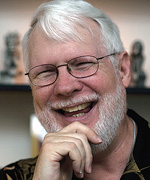Stanley McCracken, Senior Lecturer in SA
By William Harmsw-harms@uchicago.edu
News Office
 Stanley McCracken |
|
For students on the clinical track for a master’s degree in social work at the School of Social Service Administration, Stanley McCracken’s Adult Psychopathology class is something of a rite of passage.
From agoraphobia and antisocial personality disorder to trichotillomania and voyeurism—students must learn to identify, from A to Z, the mental conditions and disorders published in the Diagnostic and Statistical Manual of Mental Disorders, a licensed clinical social worker’s bible.
“When students take the class, they know they are really entering the profession,” said McCracken, Senior Lecturer at SSA, because it introduces them to the medical terms they’ll use to identify psychiatric problems and treat clients who might require medication.
“It’s like teaching them a whole new language,” said McCracken, who presents these foundational basics through lively stories, videos and occasionally, some humor.
Grades are based on scores on the final exam, which McCracken models after the licensing examinations students will later take for certification in their careers.
“There is quite a bit of memorization involved as they learn the terms. I tell them to decide what system works best for them. Many students take flash cards that they use to go over the terms. Other students work in small groups.
“I also have copies of my old exams, which I tell them they can practice on. They can do an exam as an open-book test, and then take another exam” until they have mastered the material, he said.
By learning the language of the profession, students become comfortable with working as a team member trying to help individuals through serious problems in their lives. The students in the class, like others at SSA, come into the program extremely motivated, McCracken said.
“The students at SSA all want to change the world. That means something different for each of them. Sometimes it means helping one person, and other times it means working to overcome society’s problems,” he said.
McCracken’s class on alcohol and substance abuse teaches students to recognize the signs of abuse and the tools to help individuals overcome dependency. One important invention is motivational interviewing, a technique McCracken teaches in a daylong workshop that provides opportunities for students to practice the approach.
Through motivational interviewing, professionals start a conversation in which a person with a problem is encouraged to open up, share information in a non-threatening way and eventually discover reasons why he or she needs help in overcoming a problem. The method is designed to build trust between a client and a social worker, and to help clients resolve ambivalence about change.
In addition to teaching students how to deal with the mental disorders they will encounter as social workers, McCracken also helps prepare them for dealing with the personal challenges of working in a high-stress profession.
Social workers enter what is typically a relatively low-paying profession and deal with people who have serious mental health problems. McCracken helps prepare students for some potential realities: discouragement and burnout.
“It’s a hard job, and it can be overwhelming. I tell students they have to learn to become professionals, to learn to always seek supervision, to learn how to take care of themselves, and to develop strong relationships with the people who care about them, their friends and family,” he said.
![[Chronicle]](/images/sidebar_header_oct06.gif)